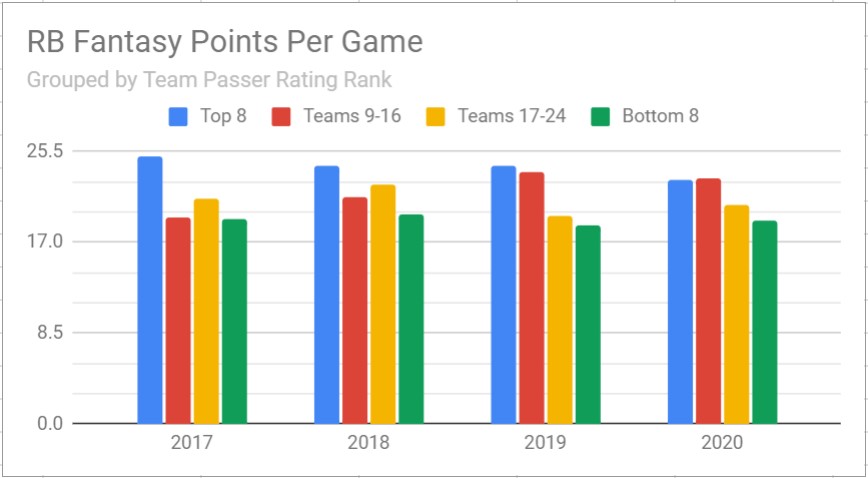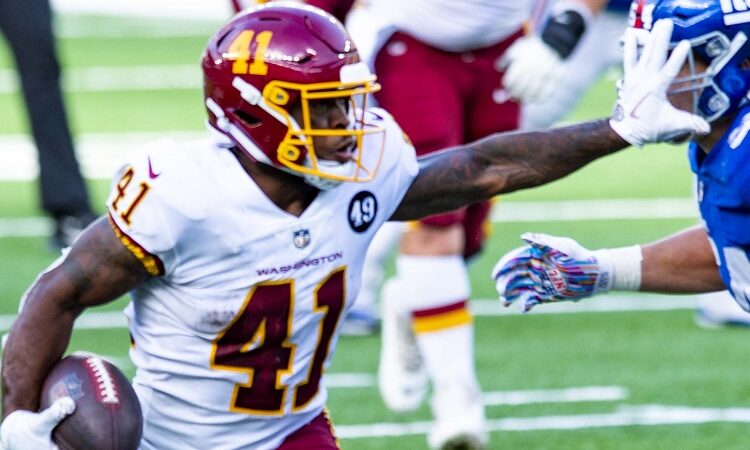This July, I rented a minivan and drove my wife and two teenage children from Tampa, FL to Des Moines, IA for a summer vacation. Fortunately, the roughly 20-hour drive to Iowa was mostly uneventful. The return trip, however, provided some thrilling, unscripted excitement. While cruising a spectacularly unspectacular stretch of road through Illinois, a tractor-trailer tire exploded just ahead of us. Pieces of steel-belted radial shrapnel quickly spread across the roadway, and I was forced to test the emergency evasive maneuverability of the 2018 Dodge Caravan to protect both my family and the vehicle itself. Fear and adrenaline flooded my veins, a cold sweat covered my body in a flash, and a solitary thought leaped to the front of my mind: do teams with bad real-life quarterbacks produce good fantasy running backs?
While the slightly exaggerated truck tire story is true, the question was something I picked up from our Discord chat. Evan Hoovler had mentioned in passing, that some fantasy players subscribe to the logic that teams with bad quarterbacks tend to lean on their running backs. Thus, making the running backs on those teams better for fantasy. I immediately set out to prove or disprove this logic using real numbers. After pouring over stats on stats on stats, I realized that the number of variables in play here is nigh incalculable. I figured the simplest way to try to prove this out would be to focus on two metrics: team passer rating and running back fantasy points per game.
I pulled these stats going back to 2017, ranked the teams by passer rating, and split those rankings into eight-team chunks. So we’ve got the Top 8, Teams 9-16, Teams 17-24, and the Bottom 8. The graph below shows the average running back fantasy points per game (HPPR), per year, for each group. And has cool, fancy colors!

Somewhat unsurprisingly, the eight teams with the highest average passer ratings in 2017, 2018, and 2019 produced more running back fantasy points per game on average than the rest of the league. In 2020, teams ranked 9th-16th in passer rating, actually outperformed the top eight passing teams… by 0.22 running back fantasy points per game on average. In 2017 and 2018, Teams 17-24 outscored Teams 9-16. However, the difference was only 1.8 and 1.2 points per game, respectively.
The biggest takeaway for me is that, over the last four years, the Bottom 8 teams in quarterback passer rating scored fewer running back fantasy points, on average, than the rest of the NFL. This would seem to disprove the theory in question. Teams that rank low in passer rating also rank low in running back fantasy scoring. In fact, in 2018, 2019, and 2020, the Bottom 8 teams by passer rating ranked below the rest of the league in total RB touches, total RB yards, and total RB touchdowns, on average. BUT, I wasn’t ready to put this to bed just yet. Let’s look at some outliers in the Bottom 8 groups that actually had significant running back success to see if we can identify any kind of pattern.
We’ll start with the 2018 Denver Broncos because, based on my research, this looks like a pretty rare case where a good ground attack wasn’t significantly slowed down by a bad air attack. The Broncos ranked 27th in team passer rating in 2018 (thanks Case Keenum), but their running game was legit, featuring a committee of Phillip Lindsay, Royce Freeman, and a splash of Devontae Booker. That trio combined to finish 7th in running back fantasy points per game that year. That pairing of rushing success and passing inferiority just does not happen consistently.
In 2020, the Patriots ranked 27th in passer rating, but 9th in RB fantasy points per game. Similarly, the Football Team ranked 28th in passer rating, but 7th in RB fantasy points per game. How did they do it? The answer is… PASSING (to their running backs). The Pats ranked 5th in RB receptions and 6th in RB receiving yards. The Football Team ranked 2nd(!) in RB receptions and 4th in RB receiving yards. Back in 2019, the Carolina Panthers were dead last in team passer rating and 4th in RB fantasy points per game. The secret? You guessed it! Carolina ranked 2nd in RB receptions and 3rd in RB receiving yards. Having a healthy CMC certainly helped. And in 2017, we see more of the same. The Titans and Bengals ranked 25th and 26th in passer rating, but 9th and 8th in RB fantasy points per game, respectively. Tennessee ranked 7th in receptions by running backs, and Cincinnati ranked 3rd.
What do we do with all of this info? I guess that’s up to you. I can tell you that there is no clear evidence to support the idea that bad QB play increases RB fantasy production. However, there is something to be said for pass-catching RBs who play on poor passing teams. But… didn’t we already know that? Savvy fantasy players are fully aware of the invaluable fantasy production that guys like J.D. McKissic and Nyheim Hines can provide. Sure, you might be able to find an under-the-radar hidden gem on a team that can’t throw the ball, and Conor McGregor might be relevant again someday. It’s just not very likely.
Do you want more 2021 fantasy football discussion? Then check out these links!
Discord!
Podcast!
Patreon!
Twitch!
[Image Source: https://upload.wikimedia.org/wikipedia/commons/f/f7/J.D._McKissic_stiff_arm.jpg under CC BY SA 2.0]


